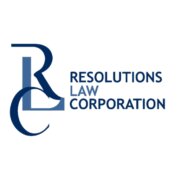Best Collaborative Law Lawyers in Burnaby
Share your needs with us, get contacted by law firms.
Free. Takes 2 min.
Free Guide to Hiring a Family Lawyer
List of the best lawyers in Burnaby, Canada
About Collaborative Law in Burnaby, Canada
Collaborative Law, also known as Collaborative Practice, is a voluntary dispute resolution process in which parties work towards a negotiated agreement, often in cases relating to divorce or family law. In Burnaby, Canada, like the rest of British Columbia, Collaborative Law offers an alternative to the traditional adversarial court process. The focus is on finding mutually beneficial solutions, preserving relationships, and maintaining confidentiality. Lawyers trained in Collaborative Law can facilitate productive negotiations and legally binding settlements without going to court.
Why You May Need a Lawyer
While it's possible to approach collaborative law without a lawyer, it's often highly beneficial to have expert legal advice and support in these situations. You might need a collaborative lawyer if you are going through a divorce or separation, dealing with child custody issues, sharing property or debts, or trying to resolve a range of family disputes in a respectful and supportive way. A lawyer ensures your rights are protected, manages legal paperwork, and offers guidance through difficult negotiations to help you reach a fair and equitable settlement.
Local Laws Overview
Collaborative Law in Burnaby falls under the broader jurisdiction of the laws in British Columbia. The process supports constructive resolutions, involving professionals like financial advisors, counsellors, child specialists, alongside lawyers to help mitigate disputes. The Family Law Act in British Columbia encourages the resolution of family disputes in a timely and collaborative manner which can more appropriately cater to the best interests of any children involved. Disclosure and transparency are expected during collaborative law negotiations, and penalties can apply in cases of dishonesty or omission.
Frequently Asked Questions
What happens if we can't reach an agreement in the collaborative law process?
Should the collaborative law process fail to achieve a settlement, the collaborative lawyers will withdraw from the case, and the parties will hire new lawyers for litigation in court.
Is a collaborative law agreement legally binding?
Yes, your collaborative law agreement can be made legally binding by incorporating it into a final order or legally enforceable contract such as a separation agreement.
Do both parties need a lawyer in the collaborative law process?
Yes, each party usually retains their own collaborative lawyer who represents their interests throughout the process.
Is collaborative law less expensive than going to court?
Collaborative law can often be less expensive than court as it avoids court fees and the expenses of a drawn-out court battle. However, costs can vary depending on the complexity of the negotiation and the professionals involved.
Is collaborative law confidential?
Yes, the collaborative law process is private and confidential. The discussions and documents in the negotiation are usually not admissable in court.
What if my spouse is being dishonest in the collaborative process?
Your collaborative lawyer can assist in managing these issues. In cases of severe dishonesty, though, the collaborative process may break down, potentially leading to court litigation.
Can we go to court once we start the collaborative law process?
If you both agree to engage in the collaborative law process, you usually agree not to go to court while negotiations are underway. However, if you can’t reach an agreement, court is the next step.
Will the collaborative process work if we have a high conflict relationship?
Collaborative law can be effective even in high conflict situations. Collaborative professionals are skilled at managing conflict, and the process is designed to reduce hostility and promote cooperative problem-solving.
Who else might be involved in the collaborative law process?
Alongside lawyers, the collaborative team may include financial advisors, child specialists, coaches, counsellors, or other professionals as needed. These experts contribute their knowledge to help resolve various aspects of the dispute.
Is there a governing body for collaborative law in Burnaby or British Columbia?
Yes, the BC Collaborative Roster Society is a governing body that ensures standards of practice for collaborative professionals and offers resources for the public about collaborative law.
Additional Resources
The BC Collaborative Roster Society and the International Academy of Collaborative Professionals can offer more information about collaborative law. The Legal Services Society’s Family Law website also provides useful resources on Collaborative Law in British Columbia.
Next Steps
If you need legal assistance in the field of Collaborative Law, your first step should be to find a lawyer trained in this practice. Make sure to check their credentials and experience in Collaborative Law. During your initial consultation, discuss your situation, ask about the process, costs, and recovery times, and get a general feel for whether the lawyer is the right fit for you. Remember, this is a collaborative process, so it's essential that you feel comfortable working with your lawyer.
Lawzana helps you find the best lawyers and law firms in Burnaby through a curated and pre-screened list of qualified legal professionals. Our platform offers rankings and detailed profiles of attorneys and law firms, allowing you to compare based on practice areas, including Collaborative Law, experience, and client feedback.
Each profile includes a description of the firm's areas of practice, client reviews, team members and partners, year of establishment, spoken languages, office locations, contact information, social media presence, and any published articles or resources. Most firms on our platform speak English and are experienced in both local and international legal matters.
Get a quote from top-rated law firms in Burnaby, Canada — quickly, securely, and without unnecessary hassle.
Disclaimer:
The information provided on this page is for general informational purposes only and does not constitute legal advice. While we strive to ensure the accuracy and relevance of the content, legal information may change over time, and interpretations of the law can vary. You should always consult with a qualified legal professional for advice specific to your situation.
We disclaim all liability for actions taken or not taken based on the content of this page. If you believe any information is incorrect or outdated, please contact us, and we will review and update it where appropriate.











